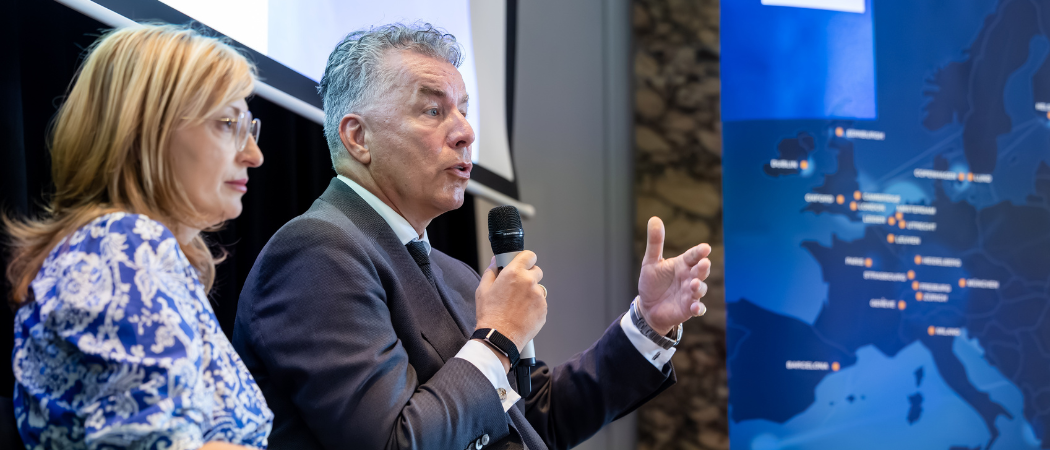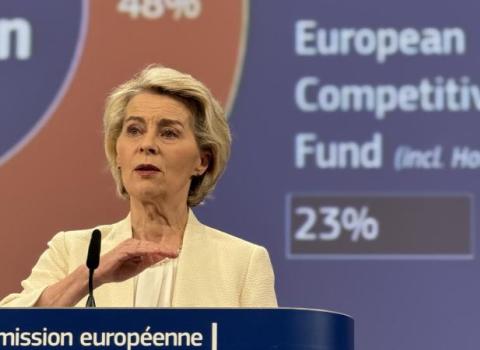Research lobbies join MEP Christian Ehler in calling for the Commission to fill gaps in its proposal for the new Horizon Europe

Ekaterina Zaharieva, the European commissioner in charge of start-ups, research and innovation (left), and MEP Christian Ehler (right). Photo credits: Geert Vanden Wijngaert
Brussels research lobbies, together with leading MEP Christian Ehler, are calling for more detail and clarity about the European Commission’s €175 billion plan for the tenth Framework Programme (FP10).
Their comments came as research Commissioner Ekaterina Zaharieva asked the research community to continue its “support” for the Commission so that “we still have a really strong standalone [programme] with a doubled budget” when negotiations conclude in 2027.
When the Commission presented its proposal in July, the research community was thrilled to see Horizon Europe remain a standalone programme after months of uncertainty and intense haggling among the Commission’s services over a plan to dismember the programme and incorporate it in a future European Competitiveness Fund (ECF).
The programme remained “standalone” with a budget nearly twice the size of the current programme, but a large chunk of that money is still slated to be spent under a joint jurisdiction with the ECF. Just how that will work has not yet been set out in detail by the Commission. It also promised to simplify the programme, allocate more money to fundamental research and boost the European Innovation Council.
Research stakeholders are now wondering how exactly the Commission will deliver on those promises, as MEPs and member states are gearing up for years of negotiation on a final budget, as well as the content and structure of the programme. An agreement is envisioned by the end of 2027.
Speaking on September 2 at an event organised by the Guild of European Research-Intensive Universities and the League of European Research Universities (LERU), two of the most prominent research lobbies in Brussels, Zaharieva urged the audience to “continue to support” the Commission, but did not offer details about the gaps in the regulation.
Research lobbies and MEPs alike are concerned about the lack of clarity in the regulation put forward by the Commission in July. Important details on how the Commission plans to simplify the programme and how defence research will be incorporated into a largely civilian programme are still missing.
“There are a lot of questions where the text is simply incomplete,” said European People’s Party MEP Christian Ehler, who has served as a co-rapporteur for Horizon Europe and a rapporteur for the rules of participation in Horizon 2020.
“We have an interesting situation where the programme is entwined in the European budget with the European Competitiveness programme,” but the Commission has yet to explain how it will “formulate that” in practice, he told delegates to the conference.
Then there is the issue of simplification. Zaharieva reiterated the need to streamline Horizon Europe to make it “easier to access, faster to manage and more flexible,” so that researchers “focus on science, not on paperwork.”
But the Commission’s plans are too vague, Ehler said. “Beyond the disputed concept of lump sums, there is very little detail on how matters will be simplified.”
Missing details
Kurt Deketelaere, secretary general of LERU, wants the Commission to make available a precise budgetary breakdown for Horizon Europe. This is currently missing in the Commission’s proposal. “We need, in the FP10 text, in the European Competitiveness Fund text, in black and white, what every part of the programme is going to get,” he said.
For example, the Commission intends to nearly double the budget for Pillar 1 in efforts to support the expansion of the European Research Council (ERC). But when looking at what this increase represents out of the total budget, the ERC is in fact receiving the same share as it currently has under Horizon Europe, Deketelaere said.
“For a number of those topics, even if they win cash-wise, it’s a little bit disappointing percentage-wise,” he added.
Related articles
- What’s coming up in research policy in the second half of 2025?
- Horizon Europe budget to double, but €68B will remain in Competitiveness Fund
Deketelaere also asked for clarity on other parts of the FP10 proposal, including the relationship between Pillar 2, which funds collaborative research projects, and the Marie Skłodowska-Curie Actions, and the governance of the Competitiveness Fund, whose regulatory text is “simply not acceptable as a legal text.”
Another ambiguity in the proposal is the future of associated countries in FP10, said Jan Palmowski, secretary general of the Guild.
“Given the repeated focus on the EU’s interest [. . .] how attractive and how possible will it be for third countries to participate in Horizon Europe?” he asked. “In other words, if there is such a tight link [with] the European Competitiveness Fund [. . .] then why should Switzerland, why should Canada continue to bother collaborating when everything links to issues of the Union, and when entities from the Union can be preferred in the selection of the awards?”
Finally, as the line between civilian and military research in EU-funded programmes gets blurrier, Ehler said the Commission should clarify how it plans to fund defence research and innovation via the ECF. “The Competitiveness Fund is supposed to set out a specific programme for defence research, but that is nowhere to be found in the text,” he said.
Zaharieva defended the Commission’s proposal to open Horizon Europe to dual use “by default” in order to strengthen the links between civilian and military research at a time of increasing geopolitical pressure. The commissioner acknowledged dual use technologies could be misused if they fall into the wrong hands but stressed that the EU would ensure “appropriate safeguards, especially in cooperative research.”
In the next stage of the legislative process, the European Parliament and the Council of Ministers will have to formulate official responses to the Commission’s proposal, marking the start of intense talks over the future of Horizon Europe. The first step is for the Parliament to pick a rapporteur, who will draft a report on the legislative and budgetary proposals for FP10. According to Ehler, this will happen in the next couple of weeks.





 A unique international forum for public research organisations and companies to connect their external engagement with strategic interests around their R&D system.
A unique international forum for public research organisations and companies to connect their external engagement with strategic interests around their R&D system.